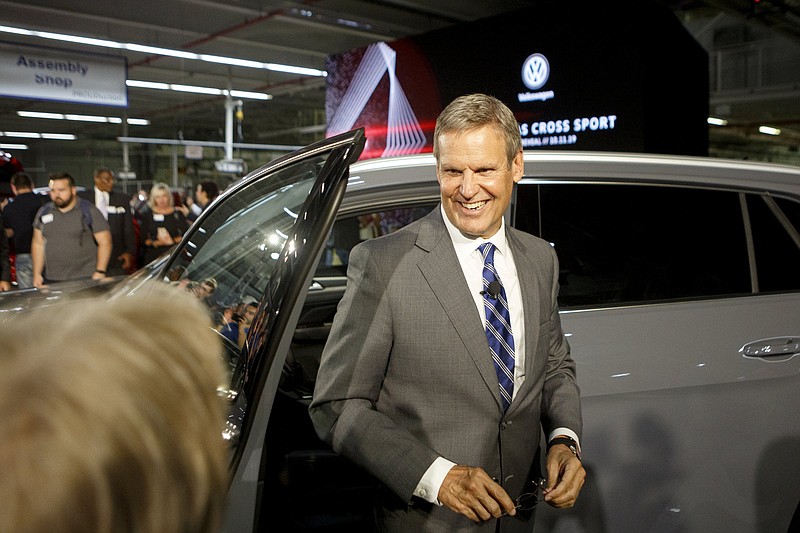In late March and April, Tennessee Gov. Bill Lee was criticized over the state's backward, unscientific and late responses to the COVID-19 virus.
He didn't tell people to stay home soon enough, he didn't take the same actions Democratic governors did, and then he planned to reopen the state's economy too soon.
Of course, the condemnations came from people who had no expertise themselves and thus could be chalked up to party politics. But still it rankled.
State Democratic Party chairwoman Mary Mancini, for instance, said Lee was "learning on the job" while Tennesseans were dying.
"This is frightening," she said. "Now is not the time to figure out on the fly how much government should be involved in saving lives. Now is the time for him to step up and lead."
A California Democratic congressman later ripped Lee for allowing his "safer-at-home" order to expire on April 30.
On Monday, though, Tennessee was announced as one of only 10 states to reach a virus testing benchmark suggested by Harvard researchers to properly track and contain the virus. It also has met federal testing goals.
"From a national perspective," said Doug Flener, spokesman for the state's unified COVID-19 response group, "Tennessee has exceeded the federal benchmark indicating states should be able to test at least 2 percent of their populations monthly, in order to make informed decisions regarding re-starting and re-opening their economies."
Tennessee also has performed the highest number of tests, has the lowest percentage of positive tests and has done more testing per 1 million people than any of the eight states that surround it.
In fact, Tennessee has performed more tests per 1 million people than the nation as a whole and has the 12th lowest percent of positive tests in the country (including Washington, D.C.).
For perspective, Kentucky, whose Democratic governor warned his residents not to go into Tennessee during the early days of the virus, has done the second fewest tests of Tennessee and the eight states that surround it and has the third fewest tests of the same nine states per 1 million people.
Lee's emphasis on testing, the willingness of state residents to heed the governor's stay-at-home orders and Lee's insistence the state reopen safely have thus far belied the criticism that was initially heaped upon him.
The announcement about testing benchmarks was one bit of good news for Tennessee in a day that saw a smattering of good news across a country in need of it.
Moderna Inc., a Massachusetts biotech company, reported the first COVID-19 virus vaccine to be tested on humans appeared to be safe and to elicit an immune response.
The tests, though not complete, were said to have created in patients antibodies at levels mirroring those in recovered virus patients.
"We're quite pleased with the breadth of the immune response so far," Dr. Stephen Hoge, Moderna's president, told "CBS This Morning."
"Safe" and "appeared to be safe" are two different things, so no one should bank on nationwide vaccine trials by summer, but some experts were now throwing out the possibility of a vaccine late this year instead of well into 2021 or beyond.
Wall Street leapt at the news, with the Dow Jones Industrial Average climbing 3.8% in its best day since early April and the S&P 500 gaining 3.1% for a 10-week high.
The vaccine test news had a more positive landing than the day's other medical news, in which President Donald Trump announced he was taking daily doses of hydroxychloroquine, an anti-malarial drug that had shown some but not definitive success with virus patients.
The Food and Drug Administration had given the drug emergency authorization for treatment of virus patients but cautioned people not to take it out of a hospital setting or a clinical trial.
Trump was immediately - and properly, we think - criticized for making such a statement. His taking the drug should be a decision only he and his doctor make. But his announcement may cause others to seek out the drug which, like many drugs, affects different people in different ways.
Nevertheless, by Monday, every state but one - Connecticut - had loosened their stay-at-home restrictions, the Big Three Detroit automakers and their suppliers (employing 1 million people) restarted their assembly lines after being closed for two months, and Delta Airlines announced it would return to flying some trans-Atlantic and Caribbean routes in June.
Meanwhile, a news Gallup poll buoyed the news in a survey that showed, among U.S. adults, "happiness has edged up 5 points, to 72%," boredom had dropped 5 points to 41% and "self-reported worry" fell from 59% in late March and early April to 47%.
The poll was mindful of the lyrics to the song "A Little Good News," recorded in 1983 by singer Anne Murray when the U.S. was emerging from a recession.
"Some senator was squawkin' 'bout the bad economy," the lyrics say. "It's gonna get worse you see, we need a change in policy. We sure could use a little good news today."
